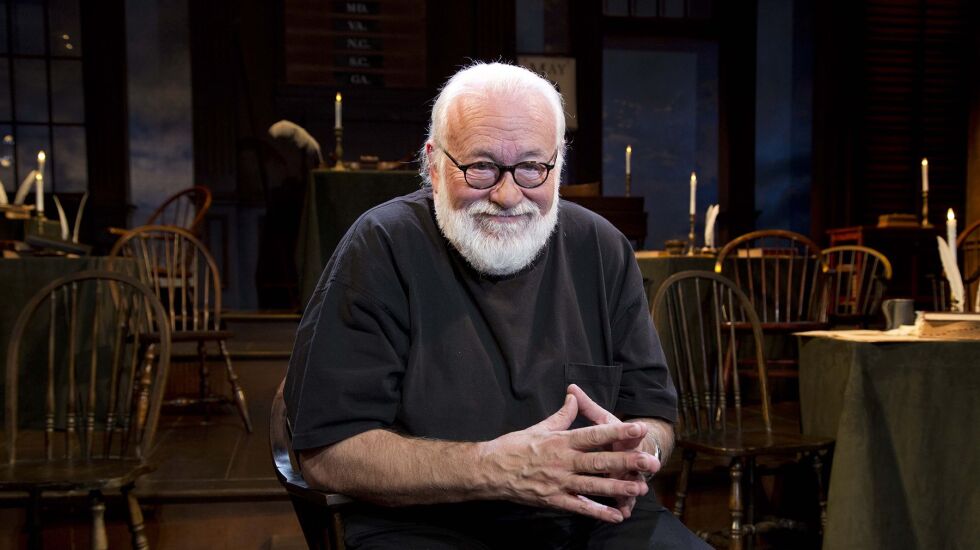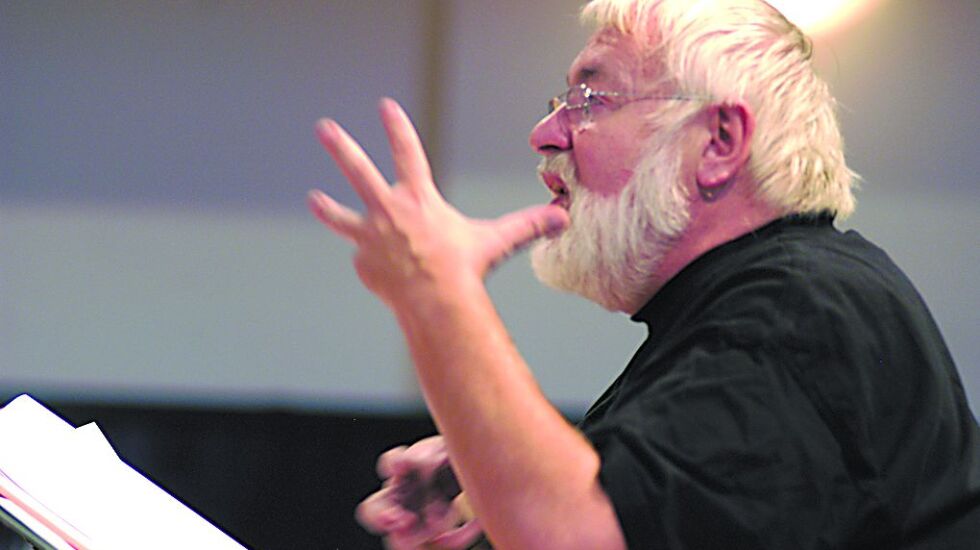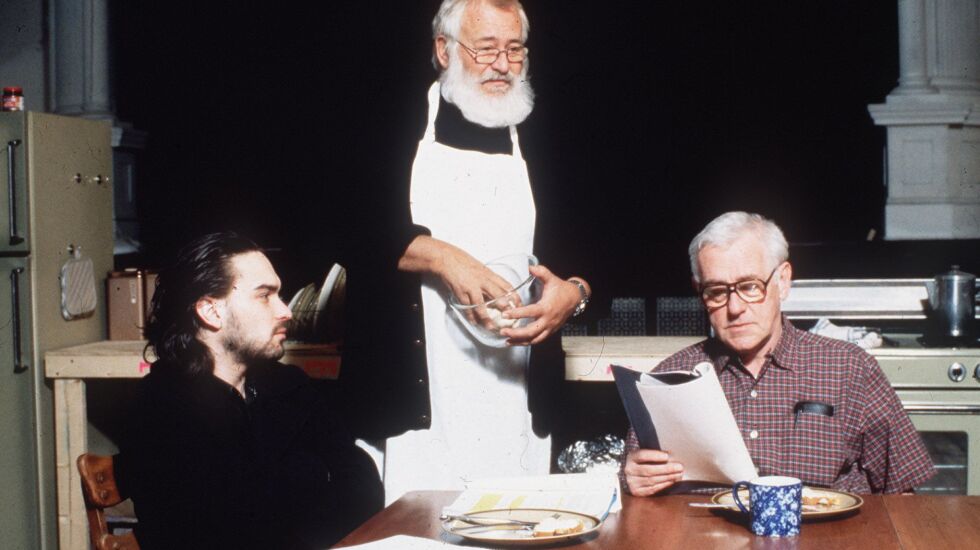
Frank Galati, the Tony Award-winning director, writer and actor who helped transform Chicago theater, has died at 79.
Mr. Galati was an icon in Chicago’s theater community, winning Tony Awards for best play and best director in 1990 for “The Grapes of Wrath,” which moved to Broadway following its critically acclaimed debut production at Steppenwolf Theatre.
He was also Tony-nominated for best director for “Ragtime” in 1998 and was nominated for an Academy Award with Lawrence Kasdan for best screenplay for “The Accidental Tourist” in 1989.
His long list of works in Chicago also included productions of “The Drawer Boy,” in which he starred opposite John Mahoney in 2001, and “The Tempest,” a 2009 production in which Mr. Galati delivered an unforgettable performance as Prospero, the world-premiere stage adaptation of “Kafka on the Shore,” “East of Eden” and Haruki Murakami’s “after the quake” at Steppenwolf as well as “The Winter’s Tale,” “The Visit” and “Cry, the Beloved Country” at the Goodman.

In a joint statement, Steppenwolf’s co-artistic directors Glenn Davis and Audrey Francis paid tribute Mr. Galati: “Frank had a profound impact on Steppenwolf, and all of us, over the years. For some, he was a teacher, mentor, director, adaptor, writer, fellow actor, and visionary. Regardless of the relationship, Frank always made others feel cared for, valued, and inspired in his ever-generous, joyful and compassionate presence.”
Mr. Galati was also known for his work in opera, directing productions of “La Traviata” and “Tosca” at Lyric Opera of Chicago and “A View from the Bridge” at both the Lyric and The Metropolitan Opera in New York.
Frank Joseph Galati Jr. was born on Nov. 29, 1943, in Highland Park. He graduated from Glenbrook High School in 1961 and went on to attend Western Illinois University and Northwestern University, where he got his master’s degree and a doctorate in speech.
He became a member of Northwestern’s faculty in 1972.
He also performed in nearly two dozen productions while an undergraduate at the university.
Mr. Galati solidified his presence in Chicago’s theater scene in the 1980s, becoming a Steppenwolf Theatre ensemble member in 1985 and the Goodman Theatre’s associate director a year later. He remained in that post until 2008.

“Frank was one of the most generous actors and directors to work with. It was Frank’s gift of inspiration to the artists around him that lifted them up into the work, to fire their imaginations, to have faith,” said Northlight Theatre artistic director BJ Jones, who first met Mr. Galati in the 1970s at the Chicago’s legendary Wisdom Bridge Theatre, where the two were co-starring in Tom Stoppard’s “Travesties.” The two remained lifelong friends.
“Chicago theater is all about the ensemble ... Frank knew how to build a cohesive ensemble through mutual respect and artistic inspiration,” Jones said.
“Love” was another trait of Mr. Galati’s directing style, according to actor and Steppenwolf Theatre co-founder Terry Kinney, who co-starred in that Tony-winning production of “The Grapes of Wrath.”

“The story of that play was the story of evolution for us for [Steppenwolf], for the level of our work,” Kinney said in an emotional interview Tuesday.
The theater company devoted two years to the Steinbeck classic, taking the production from its Chicago premiere to the La Jolla Playhouse to London and finally Broadway.
“We kept altering things and just changing the entire landscape of the play over two years and four productions. And through it all he was our company guru,” Kinney continued. “He had this infectious laugh, and his philosophy was that you create from love. You love your work into existence. That’s what he did with ‘Grapes.’ He knew that any story was the story of us all. ... By the end of two short two weeks in London, the play was so full, so complete; we played it like jazz musicians.
“This is just unbearable,” Kinney said, crying, as he continued to speak of the loss of his friend and colleague. “But love is stronger than death. And he had so much love. He endorsed people into being better. He didn’t offer criticism. He knew criticism was the enemy of creating things. ... At the end of a scene he was directing, even if it was a very long scene, where most directors would have a long critique or a series of fixes, [Frank] would just giggle and tell the actors, ‘I love it. Let’s do it again from the top. You’re gonna find it through practicing.’”
Kinney, who directed Mr. Galati’s adaptation of “East of Eden” at Steppenwolf in 2015, said his late friend was the epitome of “leading through encouragement. ... Frank carved out a legacy not only in Chicago theater but in national and international theater.”
Mr. Galati was inducted in to the Chicago LGBT Hall of Fame in 2004. He is the recipient of nine Joseph Jefferson Awards for his work in Chicago theater. Other accolades include the League of Chicago Theatres Artistic Leadership Award, and an NAACP Theatre Award.
In a statement to the Sun-Times, Steppenwolf Theatre co-founder and actor Gary Sinise called Mr. Galati a “brilliant writer, director and actor, a tremendous talent, and while his loss will be felt with sadness by all of us, his legacy of great work and his genuine kindness and generosity as a wonderful person will live on and on.”
It was Mr. Galati’s sense of joy that permeated the reminiscences of his colleagues and friends.
“Nobody loved to laugh like Frank Galati. He found joy wherever possible, and yet he was as serious a theater artist as you’ll find,” said Roche Schulfer, executive director/CEO of the Goodman Theater. “Frank was always concerned that no matter how dynamic or innovative his works were they had to connect with with audience. ... The impact he had on Chicago theater, on American theater over 50 years as a writer, director, teacher and innovator is simply immeasurable. It’s really the end of an era.”
Mr. Galati was inducted into the Theater Hall of Fame in November, an honor bestowed “on those who have made outstanding contributions to the American Theater.” It was Jones who introduced his dear friend at the event.
“His first remarks when I helped him to the stage, because he was in a wheelchair at the time, was the [Samuel] Beckett quote [from his 1953 novel “The Unnamable”]: ‘You must go on. I can’t go on. I’ll go on,’” Jones said. “That was classic Frank.”
Mr. Galati’s final show was his production of the new musical “Knoxville,” (penned by the “Ragtime” team of Lynn Ahrens and Stephen Flaherty), which opened last April at the Asolo Repertory Theatre in Sarasota, Florida.
Mr. Galati is survived by his husband, Peter Amster, and his sister Frannie Galati Clarkson.







